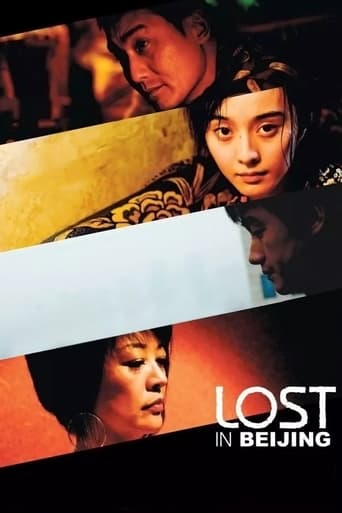lawyg
I see this movie as a commentary on the new morality in Beijing brought on by modernization. This modernization could not have happened unless there was a mobile work force so the government made a conscious effort to diminish the familial bonds. How else could a worker travel thousands of miles to Beijing or Shenzen to find work? Money had to become of greater importance. The other modernization was that men could only legally marry one woman. In previous times, men would take another wife. In previous times, families would buy children.With these two changes to Chinese society, this movie could ensue. An Kun and Liu can now be in Beijing. Lin Dong and Wang Mei would be childless. The lust, heartbreak, the anguish, the loathing, all results. The viewer is left with the question whether the new morality is better than the old. I think the writers preferred the old.
Michael Bear
This movie came as a bit of a shock to someone who had lived in China as an exchange student in the 1980s, when only the most stifling, gov't approved propaganda films were allowed. I knew China had changed since I had been there, but this was an eye-opener. Some of the sex/rape scenes were more explicit than in many Western films. The plot seemed to go from very serious to semi-absurd, as the rapist negotiates a detailed contract with the couple whose wife he raped--and, they agree to it.Anyway, overall, I think the film was well-made and shows how complex life in modern China can become--but, brace yourself for lots of sex. I can certainly understand why communist authorities in China banned the film. If I was a commie, I'd ban it too! ;-)
sitenoise
China's weird. Didn't we just learn from the Olympic Committee that there's billions of people living there? I think we did. Why then is this one of only a few films I can think of, off the top of my head, coming from there that has any semblance of lived-life-now? Lived life now under peculiar circumstances, sure, because it is a movie after all, but still. Everything else seems to be costumed drama kung fu palace historical Mao-sanctioned fantasy crap. I'm talking mainland China here. Taiwan and Hong Kong don't count. Ang Lee doesn't count. All the Chinese filmmakers making films in other parts of the world, and getting them financed and released in other parts of the world, don't countand there's the rub.Lost in Beijing is banned in China and its filmmakers are banned for two years from making films in China. What kind of nonsensical time-out is that? I mean no disrespect to the Chinese, I just want more of them to fall through the cracks and make films like Lost in Beijingwhich is nothing like Farewell My Hero's Kingdom of Flying Yellow Flowers.Fan Bingbing, known in the west as Bingbing Fan, stars in this film as Liu Ping Guo (Ping Guo, the Chinese title, translates literally as "Apple"), a foot massage girl who is raped by her boss (played out-of-this-worldly great by Tony Leung Ka Fai who's been in enough movies that every Chinese citizen could pick a film of his to see without any two people seeing the same filmwestern audiences may know him as the guy who has sex with Marguerite Duras in The Lover), and the rape is witnessed by her husband, a window washer who just happens to be hanging from a scaffolding washing the windows of the room at the massage parlor where the rape takes place. Foot massage is big business in China so I guess that's why this massage parlor is some kind of skyscraper that needs these scaffolded window washers, but I digress. The husband sees this as an opportunity to milk a little money from the well to do parlor owner. Lost in Beijing turns a critical eye toward the new moneyed urban class set against the rural, immigrant-in-their-own-country, if you will, working class.Bingbing's husband confronts Tony's wife with the rape news and demands money for his pain and suffering, yes, you read that right, his pain and suffering. Tony's wife laughs at him and suggests a better revenge would be for him to have sex with her, and then in a moment of barely noticed brilliance while she's riding him cowgirl puts sunglasses on him so she can't see him looking at her.It turns out Bingbing is pregnant and things get a little more complicated. If you complain when a film uses overly convenient plot devices to move forward you probably won't like this film as much as I do. I'm more concerned with the caliber of the characters. All four of the main performances in Lost in Beijing are magnificent. (Tony's relationship with, and handling of, his over sized wallet/day-planner is hilarious, as is his response of randomly checking the top of his head for bald spots when he's busted for trying to use a mirror to peek at Bingbing in the shower.) The direction is good and the camera-work creative, sometimes a little too creative to the point where I got dizzy a couple times so I'm deducting a point for that. Beijing is the backdrop here, captured in all its beautiful gray and desolate self.
ebossert
I normally wouldn't waste my time criticizing a useless movie such as this. However, I'm off of work this week, so I have plenty of time to wallow in meaningless trivialities. To start, let me say that I frequently enjoy non-commercial, non-mainstream, non-American cinema. (Feel free to click on my user profile for a supporting filmography.) That said, there are plenty of bad movies that are released in countries outside of the U.S. Trust me, I've been tortured by hundreds of them. "Lost In Beijing" is one particularly bad film.The opening half hour is an impressive, non-stop exhibition of moral degeneracy. This film provides some classic morals that belong on the same level as Kim Ki-duk's "Bad Guy" (2001). 1. women actually enjoy being raped; 2. rape should be glorified, praised, and respected; 3. feel free to rape any woman you like, because while your "doing" her she'll eventually start to like it and reach orgasm; 4. if you're wife gets raped, make sure you blackmail her rapist for lots of money, but if he doesn't pay, just repeatedly bang his slut of a wife as compensation; 5. if you're wife gets raped, be sure to screw and degrade her the next day while playing the role of the rapist, taunting her with lines like, "Did he fu*k you like this?"; 6. if you're husband is a rapist, just accept it; 7. after you personally get raped, befriend your rapist and hang out with him whenever possible.How can anyone in their right mind care about any of these characters? They're nothing more than a bunch of degenerates who not only live their lives in careless ways, but actually revel in their meaninglessness and support each other. Don't misunderstand me though. I'm very capable of enjoying films that depict lifestyles and morals that are contradictory to my own. "Ichi the Killer" (2001) and "Moonlight Whispers" (1999) are very interesting portrayals of sado-masochism. "Strange Circus" (2005) is an exceedingly perverted play on child sexual abuse. "Marriage Is A Crazy Thing" (2002) is a scathing indictment on traditional marriage. Even religiously-based movies like "Running On Karma" (2003) and "Samsara" (2001) have entertained me on occasion. The difference is that those films actually have some interesting psychological content and character development to them, whereas "Lost In Beijing" has virtually none.It's known that people with unorthodox mindsets exist on this planet, but without some kind of character development or psychology behind the acts themselves, you end up with a superficial exposition of despicable behavior. Why, exactly, does Bing Bing eventually befriend and care for her rapist? Why does the wife of a rapist accept his behavior unconditionally? The filmmakers never bothered to tell us. Even the obvious juxtaposition of rich and poor classes was ineptly conceived and in the end served as a mere situational ploy. It all feels too bland and forgettable after the filthy opening half hour subsides. Other reviewers here seem to have confused moral ambiguity with complex characterization. The reason you can't choose which person to root for is because they weren't developed properly. Don't think that this movie has complex characters just because they're not clearly defined. On the contrary, the reason they're not clearly defined is because we know nothing about them or what they're thinking. This is hardly a positive attribute of this movie. On the positive side, the camera-work and acting are quite good, but everything else just gets duller and duller as the film progresses. You can place this alongside trash like "Turning Gate" (2002), "What Time Is It There" (2001), "Irreversible" (2002), and the aforementioned "Bad Guy."


 AD
AD



